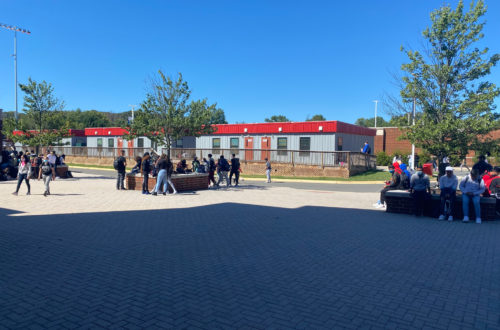Guy Cardwell
Editor
4 years ago, the United States had an annual inflation rate of just 1.9%. In 2022, that number has soared to 8.5%. These aren’t abstract numbers; everyday, students are noticing worrying effects of this financial situation.
“[It’s difficult] seeing the price of filling my tank tick up go way higher than I anticipated,” said Junior Elijah Speckart. In the last year, gas prices have gone up 44%. The impact of inflation may be impossible to miss, even for highschoolers, but what has and hasn’t been done to rectify the problem?
First, it’s important to understand what inflation is. According to the International Monetary Fund, “inflation is the rate of increase in prices over time.” As everything becomes more expensive, a single unit of currency becomes less and less valuable. Some degree of inflation is good; The Federal Reserve (the branch of government which dictates monetary policy) aims for an annual inflation rate of 2%. This is because low inflation is predictable, and it incentivizes people to spend their money earlier and take out loans, stimulating the economy. Inflation generally happens when producers can not keep up with demand. This could come as a result of increased spending from consumers or increased costs of production.
COVID-19 and government measures to prevent its spread slowed down supply chains, driving up costs. At the same time, wages have broadly increased. These factors have greatly contributed to the inflation rates today. On a national level, Republicans have widely condemned President Biden, while some Democrats have insisted that the president has limited control over inflation, and perhaps the Trump-appointed head of the Federal Reserve Jerome Powell is to blame.
At a local level, however, opinions of students seem less partisan. During interviews, some students explained how the school curriculum had shaped their understanding of the issue. Senior Robert Williams said, “We just learned this in AP Government; The [federal reserve] can control inflation by raising and lowering interest rates.” Student solutions center around slowing down the economy and finding solutions to reduce costs. “The most important role of government is… preventing possible economic crashes,” said Speckart. In some cases this means searching for cheaper alternatives. Junior Edan Adger said, “[we can] mitigate the rising cost of products and look for cheaper and better substitutes in use of the products before.”
One overlooked cause of inflation, however, has to do with American trade policy. In 2016, President Trump imposed tariffs on China and a number of other foreign countries. This may have reduced competition for some American businesses, but many US-made products rely on foreign production. History has shown that high tariffs widely hurt the American economy. For example, one of the primary causes of the great depression of the 1930s was the Smoot-Hawley Tariff, which taxed foreign goods. Put simply, raising the price of foreign imports damages the domestic industries which rely on them.
Cutting tariffs would lower the cost of goods, slowing down inflation. Despite this fact, President Biden has largely left tariffs on Chinese goods in place. Even a tariff on Canadian lumber remains. This policy decision is baffling, since cutting Tariffs would reduce the annual inflation rate by an estimated 1.3%. It’s hard to justify this type of policy, but across the political aisle, politicians continue to impose economically destructive policies motivated by nationalism.
Students are quickly approaching adulthood, and they are worried about the state of inflation. “If something is not done, many families will not be able to support themselves much longer,” said Adger. Speckart shared a similar sentiment, saying, “I’m going to be entering the job and housing markets, and if my wages don’t reflect the price of housing it could lead to a lot of monetary woes.”
A number of Alexandria City High School students will be 18 this November during the congressional election, and nearly every student will be eligible to vote in the next presidential election. Bad economic policy, not only tariffs, is rampant in modern American politics, and students have the power to vote in their own interests. The younger generation will play a key role in determining the economic fate of this country, and this means rejecting irrational “America first” economic policy.





